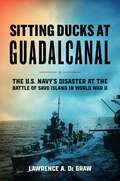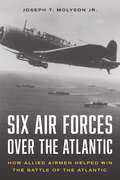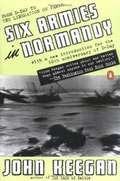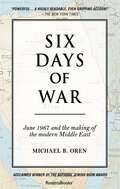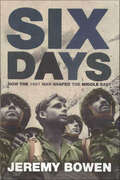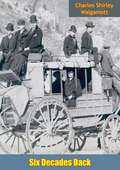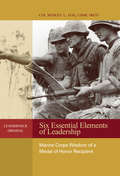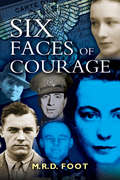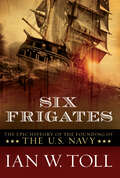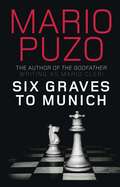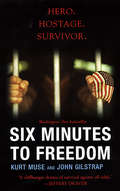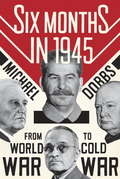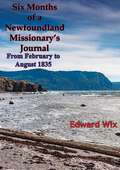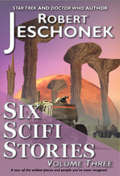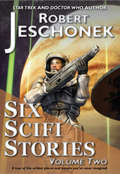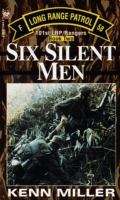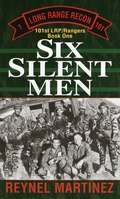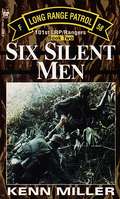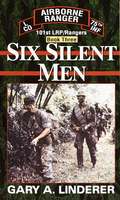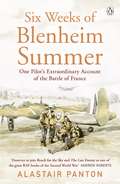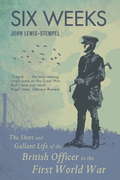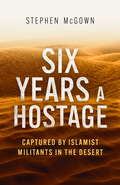- Table View
- List View
Sitting Ducks at Guadalcanal: The U.S. Navy's Disaster at the Battle of Savo Island in World War II
by Lawrence A. De GrawOn August 7, 1942, U.S. Marines waded ashore in the Solomons, defended by warships of the U.S. Navy. The amphibious landing was the first major American ground campaign of the Pacific War, intended to prevent the Japanese from establishing naval and air bases in the island chain and to establish Allied bases for future operations. Most famously—and most gruelingly—the invasion marked the beginning of the months-long Guadalcanal campaign. Caught off guard, the Japanese swiftly regrouped for a seaborne counterattack on the night of August 8–9. The result was one of the worst American naval defeats of the war after Pearl Harbor.In this meticulous minute-by-minute retelling of the First Battle of Savo Island, Lawrence De Graw covers the navy&’s role in the initial landings on Guadalcanal before setting the stage for the naval clash that would come the next night. On the eighth, the American commander, fearing Japanese attacks and cautious about fuel levels, withdrew his aircraft carriers and let his cruisers and destroyers—exhausted from two days of high alert and combat—operate with only half their crews on duty. The navy was unaware the Japanese had been training to fight at night. The American ships were sitting ducks when the Japanese fleet steamed through &“The Slot&” between Savo Island and Guadalcanal and into what became known as &“Ironbottom Sound.&” In little more than thirty minutes, the Japanese sent three U.S. (and one Australian) heavy cruisers to the bottom and damaged three other vessels. The American fleet withdrew from the area for the foreseeable future and limited shipments of men and materiel to the daytime, helping turn the battle of Guadalcanal into a long, hard slog.Sitting Ducks at Guadalcanal is naval history, featuring a colorful narrative that covers the big picture as well as stories of individual vessels and sailors as well as a careful analysis of the battle and just what went wrong for the U.S. Navy off the island of Guadalcanal.
Six Air Forces Over the Atlantic: How Allied Airmen Helped Win the Battle of the Atlantic
by Joseph T. Molyson Jr.The Battle of the Atlantic was the longest campaign of World War II, lasting the entirety of the war in Europe from September 1939 to May 1945. It was also one of the war&’s most complex campaigns, involving strategy, operations, tactics, logistics, politics, diplomacy, and alliances. During the war&’s first two years, the United States was drawn deeper into partnership with Great Britain, and closer toward conflict with Germany, in the waters of the North Atlantic. Franklin Roosevelt realized this theater&’s importance: &“I believe the outcome of this struggle is going to be decided in the Atlantic.&” And so American, British, and Canadian forces battled Germans at sea and in the air to protect the flow of first materiel and then men from the United States to the United Kingdom. The sea part has been well covered: how German U-boats and other warships hunted Allied convoys and how the Allies ultimately turned the tide. Not so much the air war. In Six Air Forces over the Atlantic, Joseph Molyson tells the story of the Battle of the Atlantic from the perspective of the air forces—and airmen—who waged it from the skies above the icy waters of the North Atlantic. He blends big-picture attention to strategy and tactics with dramatic episodes of air-to-air and air-to-sea combat, including the engagement in which a British light bomber captured a German U-boat near Iceland. He details the close eye Franklin Roosevelt kept on the campaign, the effect B-24 Liberator bombers had, and the rise of the Royal Air Force Coastal Command as a true U-boat-busting force. The result was victory in the Atlantic, as well as a significant contribution to victory in World War II.
Six Armies In Normandy: From D-day To The Liberation Of Paris
by John KeeganThe armies of six nations met on the battlefields of Normandy in what was to be the greatest Allied achievement of World War II. With dramatic, driving power, John Keegan describes the massed armies—American, Canadian, English, French, German, and Polish—at successive stages of the invasion. As he details the strategies of the military engagements, Keegan brilliantly shows how each of the armies reflected its own nation's values and traditions. In a new introduction written especially to commemorate the 50th anniversary of D-Day, he contemplates the ways the events at the battle of Normandy still reverberate today.
Six Days of War
by Michael OrenFor six tense days between June 5 and 10, 1967, war raged between Israel and its neighbors, Egypt, Jordan, and Syria. There are many contexts in which this story makes sense, but only Michael Oren, a widely published American-born Israel scholar and historian, has so far knitted the diverse strands into a cohesive fabric that remains vital and relevant today. With educated authority and authorial integrity, Oren manages to sketch out facts and motives with the same intrigue as battles and strategies. Escalating territorial and populist tensions in the Middle East only serve to make this title more relevant. Anyone who wants to have a grasp of Middle Eastern politics or political tensions involving Israel must read this title. Six Days of War was a New York Times Bestseller and Washington Post Best Book Award Winner in 2002 and has gone on to be an internationally acclaimed bestseller. The book has been widely recognized as the definitive telling of the Six Day War. ABOUT THE AUTHOR Michael B. Oren is an American-born Israel scholar and historian. Oren has published numerous articles, books, and essays on the history and diplomatic affairs of the Middle East, and was appointed as Israeli Ambassador to the United States in 2009. Ambassador Oren has written extensively for The Wall Street Journal, The New York Times, and The New Republic, where he was a contributing editor. His two most recent books, Six Days of War: June 1967 and the Making of the Modern Middle East and Power, Faith, and Fantasy: America in the Middle East, 1776 to the Present, were both New York Times bestsellers. They won the Los Angeles Times History Book of the Year prize, the Washington Post Best Book Award, a National Council of the Humanities Award, and the National Jewish Book Award. Raised in New Jersey, Ambassador Oren moved to Israel in the 1970s. He served as an officer in the Israel Defense Forces, in the paratroopers in the Lebanon War, a liaison with the U.S. Sixth Fleet during the Gulf War, and an IDF spokesman during the Second Lebanon War and the Gaza operation in January 2009. He acted as an Israeli Emissary to Jewish refuseniks in the Soviet Union, as an advisor to Israel's delegation to the United Nations, and as the government's director of Inter-Religious Affairs.
Six Days of War
by Michael OrenFor six tense days between June 5 and 10, 1967, war raged between Israel and its neighbors, Egypt, Jordan, and Syria. There are many contexts in which this story makes sense, but only Michael Oren, a widely published American-born Israel scholar and historian, has so far knitted the diverse strands into a cohesive fabric that remains vital and relevant today. With educated authority and authorial integrity, Oren manages to sketch out facts and motives with the same intrigue as battles and strategies. Escalating territorial and populist tensions in the Middle East only serve to make this title more relevant. Anyone who wants to have a grasp of Middle Eastern politics or political tensions involving Israel must read this title. Six Days of War was a New York Times Bestseller and Washington Post Best Book Award Winner in 2002 and has gone on to be an internationally acclaimed bestseller. The book has been widely recognized as the definitive telling of the Six Day War.
Six Days: How the 1967 War Shaped the Middle East
by Jeremy BowenA rigorous and original piece of modern history is as vivid as fiction, Jeremy Bowen's Six Days not only sheds new light on one of the key conflicts of the twentieth century, it explains much about the Middle East and the problems the region still faces today. Suicide attacks on Israelis, bombings, assassinations, and bloodshed in Jerusalem, Gaza, and the West Bank dominate the news from the Middle East. It is the most troubled region on earth. At its heart is the conflict between Palestinians and Israelis - and the legacy of six days of war in 1967.After the state of Israel emerged from war in 1948, both sides knew more battles were coming. In June 1967, years of slow-burning tension exploded. In six extraordinary days, Israel destroyed the armed forces of Egypt, Jordan, and Syria. But far from bringing peace, as many Israelis hoped, their stunning victory turned into a curse.From the initial battle order issued to the Israeli air force on Monday June 5, 1967 to the final ceasefire on the evening of Saturday the 10th, the Six-Day War was a riveting human drama. Building on his first-hand experience of the region after his five years as the BBC's Middle East Correspondent, as well as extensive original research, Jeremy Bowen presents a compelling new history of the conflict. Six Days recreates day by day, hour by hour, the bullying and brinckmanship that led four nations to war, interweaving testimonies of combatants from all sides in a seamless narrative.
Six Decades Back
by Charles Shirley WalgamottCharles Shirley Walgamott arrived by stage at Rock Creek Station, Idaho Territory, on August 8, 1875. In an untamed land, far from his native Iowa, he survived illness, hardship, and lawlessness with his humor intact. Never a stranger to work, Walgamott mined, trapped, ranched, and hunted. While living with settlers, Indians, and outlaws alike, he amassed a trove of unforgettable experiences.First published in 1936, this one-volume book represents a collection of his fascinating stories, which were published in the mid-1920s."A glowing, colorful, and interesting section of the true frontier....stories exceptionally well done, for every one of them has pith and point and is effectively told."--The New York Times
Six Essential Elements of Leadership
by Wesley L. FoxCol. Wesley Fox is a Medal of Honor recipient who wrote two widely respected accounts of his wartime experiences in the Marine Corps. His books, Marine Rifleman: Forty-Three Years in the Corps and Courage and Fear: A Primer, are both considered classic war memoirs.Drawing on over four decades of leadership experience, both during two wars and peacetime, Fox insists that a good leader must focus on building an organization based on the bonds of comradeship. Successful leaders are those who are actively concerned with the health, happiness, and daily lives of those who follow them. He contends that those who have such leaders will be better prepared to cope with any challenge because they are part of a group built on loyalty and trust. Fox defines the six essential elements of successful leadership as care, personality, knowledge, motivation, commitment, and communication. He presents a chapter on each element, recounts how his views of leadership were forged, and offers impressive examples of leadership displayed by his fellow Marines. While drawn directly from his military experience, Fox contends that these six elements apply to all who want to pursue effective leadership. His book is certain to inspire and motivate both civilians and members of the military.
Six Faces of Courage
by Michael FootProfessor Michael Foot is indisputably the greatest authority on the activities of SOE in Europe during WW2. In Six Faces of Courage he selects six of the bravest of the brave agents and describes their backgrounds, activities and characters. Truly inspiring reading complemented by an updated introduction that sets the scene superbly. This excellent and successful book gives the reader a real insight to what it meant to be a SOE agent in Nazi-occupied Europe.
Six Frigates: The Epic History of the Founding of the U.S. Navy
by Ian W. Toll"A fluent, intelligent history...give[s] the reader a feel for the human quirks and harsh demands of life at sea."—New York Times Book Review Before the ink was dry on the U.S. Constitution, the establishment of a permanent military became the most divisive issue facing the new government. The founders—particularly Jefferson, Madison, and Adams—debated fiercely. Would a standing army be the thin end of dictatorship? Would a navy protect from pirates or drain the treasury and provoke hostility? Britain alone had hundreds of powerful warships. From the decision to build six heavy frigates, through the cliff-hanger campaign against Tripoli, to the war that shook the world in 1812, Ian W. Toll tells this grand tale with the political insight of Founding Brothers and the narrative flair of Patrick O'Brian.
Six Graves to Munich
by Mario PuzoIn the final days of the Second World War, Michael Rogan, an American intelligence officer, is tortured by a group of seven senior Gestapo officers who need to discover the secrets he alone can give them. Ten years later, when he has recovered from the appalling injuries he suffered, and determined to revenge the death of his wife at the hands of the same men, he begins a quest to track down and kill each one of his tormentors. Dark, violent, and graphic, this is an addictive thriller about how far one man will go to exact his own justice. Written a year before Puzo completed The Godfather, published under a pseudonym and only very recently brought to light, Six Graves to Munich bears all the hallmarks of a master storyteller.
Six Minutes To Freedom
by John Gilstrap Kurt MuseDear President Bush,My name is Kimberly Anne Muse. I am writing this letter not for me but for my father, Kurt Frederick Muse. As you should know by now, he is a political prisoner in Panama. . .. Born in the United States and raised in Panama, Kurt Muse grew up with a deep love for his adopted country. But the crushing regime of General Manuel Noriega in the late 1980s threatened his, and a nation's, freedom. A nightmare of murder and unexplained disappearances compelled Kurt and a few trusted friends to begin a clandestine radio campaign, urging the people of Panama to rise up for their basic human rights. Six Minutes to Freedom is the remarkable tale of Kurt Muse's arrest and harrowing months of imprisonment; his eyewitness accounts of torture; and the plight of his family as they fled for their lives. It is also the heart-pounding account of the only American civilian ever rescued by the elite Delta Force. Timelier than ever, this is a thrilling and highly personal narrative about one man's courage and dedication to his beliefs. "A cliffhanger drama of survival against all odds." --Jeffery Deaver"A dramatic portrayal of idealism, courage, integrity, and fortitude." --John Douglas and Mark Olshaker "A must-read for anyone interested in how Delta Force operates." --John Weisman "Harrowing, entertaining, inspiring, and very, very readable." --Col. Lee A. Van Arsdale, U.S. Army Special Forces (Ret) "A thrilling chronicle that puts a human face on unspeakable actions." --Continental magazine A Featured Alternate of the Military Book Club
Six Minutes to Midnight: Lawman With A Cause / Six Minutes To Midnight (mission: Six) (Mission: Six #6)
by Elle JamesHe’s a navy SEAL who’s highly trained for any assignment.So why can’t he resist the woman he’s vowed to protect?Navy SEAL “T-Mac” Trace McGuire is assigned to protect army specialist Kinsley Anderson and Agar, her IED-detecting dog. When they’re shot at and nearly blown up, T-Mac admires Kinsley’s ability to hold her own. On the run from terrorists, T-Mac is trained to ensure their safety and survival in the African desert. He’s prepared for every scenario but one: falling for the woman whose life is in his hands.Mission: Six
Six Months in 1945
by Michael DobbsFrom the author of the best-selling One Minute to Midnight, a riveting account of the pivotal six-month period spanning the end of World War II, the dawn of the nuclear age, and the beginning of the Cold War. When Roosevelt, Stalin, and Churchill met in Yalta in February 1945, Hitler's armies were on the run and victory was imminent. The Big Three wanted to draft a blueprint for a lasting peace--but instead set the stage for a forty-four-year division of Europe into Soviet and western spheres of influence. After fighting side by side for nearly four years, their political alliance was rapidly fracturing. By the time the leaders met again in Potsdam in July 1945, Russians and Americans were squabbling over the future of Germany and Churchill was warning about an "iron curtain" being drawn down over the Continent. These six months witnessed some of the most dramatic moments of the twentieth century: the cataclysmic battle for Berlin, the death of Franklin Roosevelt, the discovery of the Nazi concentration camps, Churchill's electoral defeat, and the dropping of atomic bombs on Japan. While their armies linked up in the heart of Europe, the political leaders maneuvered for leverage: Stalin using his nation's wartime sacrifices to claim spoils, Churchill doing his best to halt Britain's waning influence, FDR trying to charm Stalin, Truman determined to stand up to an increasingly assertive Soviet superpower. Six Months in 1945 brilliantly captures this momentous historical turning point, chronicling the geopolitical twists behind the descent of the iron curtain, while illuminating the aims and personalities of larger-than-life political giants. It is a vividly rendered story of individual and national interests in fierce competition at a seminal moment in history.
Six Months of a Newfoundland Missionary's Journal From February to August 1835: From February To A - Scholar's Choice Edition
by Edward WixThe Anglican minister, who served first at Bonavista in 1829 and then at St. Johns, made extensive journeys along the Newfoundland and Labrador coasts in 1830 and 1835. The present journal of his 1835 tour and his active involvement in the Society for the Propagation of the Gospel, the Society for Promoting Christian Knowledge, the Temperance Society, church building and fund-raising, played a decisive role in the decision to create the diocese of Newfoundland and Bermuda in 1837, with Aubrey George Spencer being appointed the first bishop. Interestingly Wix left Newfoundland in poor health and in debt to the amount of 1300 pounds after having been seen in the company of a prostitute."Aimed at possible supporters of the mission to Newfoundland, [Wix’s journal] contained many interesting comments on contemporary life. He was critical of the Roman Catholics of St. Johns, "who are excited to frequent breaches of the peace by the most seditious Romish priesthood" and contrasted their behaviour with that of the friendly Roman Catholics of Placentia. He lamented the state of communications, asserting that it cost 25s. to convey a letter from Trinity to St. John’s. He was shocked by the material, moral, and spiritual destitution which he encountered. On the Isle of Valen he found females dirty and almost naked, and performed baptisms in private houses because the mothers lacked clothes for churchgoing. One man in Fortune Bay had not seen a clergyman for 56 years. Always he had to compete with "grog ships". In The Bay of Islands he found profligacy, drunken orgies, and incest, and stated that "profanity is a dialect." His journal’s appeal for help to save Newfoundland from sinking into heathendom did much to convince the Church of England that a bishop was needed." (Frederick Jones, DCB)
Six Poppies
by Lisa CarterAn achingly authentic and raw portrait of love, regret, and healing. This unforgettable journey of resilience and redemption will capture your heart and soul.‘Lisa Carter weaves an earth-shattering tale’ Woman's Own‘A heart-wrenching story’ WomanThis military romance is perfect for fans of Nicholas Sparks, Jojo Moyes, and Kristin Hannah.—Afghanistan, 2007. Carl meets Sarah, a nurse, at Camp Bastion and they feel an instant connection. But she’s the girlfriend of his fellow soldier, Danny, so he pledges to keep his distance.Finally back in England, Carl vows to never forget those who didn't make it home, honouring each of them with a tattoo of a poppy. While many miles away, Sarah tries to forget the man she swore to leave behind.But when Carl and Sarah are thrown back together, it’s clear that both of them are broken. But do the scars of what they went through run to deep, or is there a chance they can find happiness again, together . . .—Praise for Six Poppies‘A warm, emotional, roller-coaster of a read… I adored this sweepingly romantic debut’ Daily Mail
Six Scifi Stories Volume Three
by Robert T. Jeschonek Ben BaldwinIn these pages, Robert T. Jeschonek will take you on a tour of the wildest places and people you've never imagined. You've never met anyone quite like Heavy, the alien wheeler-dealer with a hundred faces...Imago, the stained glass robot on the trail of the last proto-Christ...Vladimir Lenin, a shapeshifting alien who starts the Communist Revolution...Father Obregon, the genetically-modified space priest...Grist Halcyon, sleepless pilot of a deadly Battlenaut war machine...or the Freedom Shell, an assistive exoskeleton with a murderous mind of its own. This volume includes six scifi e-book stories and novelettes for one low price.Don't miss these edgy, exciting, and surprising science fiction tales by award-winning Star Trek and Doctor Who author Robert T. Jeschonek, a master of unique and unexpected science fiction that really packs a punch. Simon & Schuster, DAW Books, and DC Comics have published his work.
Six Scifi Stories Volume Two
by Robert T. JeschonekIn these pages, Robert Jeschonek will take you on a tour of the wildest places and people you've never imagined. You've never met anyone quite like Nona Stiletto, the sexy cyborg exterminator who takes on a planet of alien monsters...Thal Simoleon, baseball player of the future, condemned to death for losing the World Series...Cilla Franklin, an American teacher whose students are naked killer savages...Mike the Future Man, a high tech time traveler fighting to find a missing child...Vicky Dozen, the bioengineering genebilly whipping up rhinoporcupines in Best Virginia...or Philippa the cross-dressing Conquistadora of outer space. Don't miss these edgy, exciting, and surprising science fiction tales by a Star Trek and Doctor Who author. It's the latest collection from award-winning storyteller Robert Jeschonek, a master of unique and unexpected science fiction that really packs a punch.
Six Silent Men
by Kenn MillerFROM THE BACK COVER: 1/101 LRRP Detachment: "A scruffy crew of cocky scofflaws..." In the summer of 1967, the good old days were ending for the hardcore 1st Brigade LRRP's of the 101st Airborne Division, perhaps the finest maneuver element of its size in the history of the United States Army. It was a bitter pill. After working on their own in Vietnam for more than two years, the Brigade LRRPs were ordered to join forces with the division once again. But even as these formidable hunters and killers were themselves swallowed up by the Screaming Eagles' Division LRPs to eventually become F Co LRRP tradition. From saturation patrols along the Lao border to near- suicide missions and compromised positions in the always dangerous Ashau Valley, the F/58 unflinchingly faced death every day and became one of the most highly decorated companies in the history of the 101st.
Six Silent Men
by Reynel Martinez"No way in hell you could survive 'out there' with six men. You couldn't live thirty minutes 'out there' with only six men." [pg. 13] In 1965 nearly four hundred men were interviewed and only thirty-two selected for the infant LRRP Detachment of the 1st Brigade, 101st Airborne Division. Old-timers called it the suicide unit. Whether conducting prisoner snatches, search and destroy missions, or hunting for the enemy's secret base camps, LRRPs depended on one another 110 percent. One false step, one small mistake by one man could mean sudden death for all. Author Reynel Martinez, himself a 101st LRRP Detachment veteran, takes us into the lives and battles of the extraordinary men for whom the brotherhood of war was and is an ever-present reality: the courage, the sacrifice, the sense of loss when one of your own dies. In the hills, valleys, and triple-canopy jungles, the ambushes, firefights, and copter crashes, LRRPs were among the best and bravest to fight in Vietnam.
Six Silent Men, Book Two (101st LRP Rangers #2)
by Kenn MillerIn the summer of 1967, the good old days were ending for the hard-core 1st Brigade LRRPs of the 101st Airborne Division, perhaps the finest maneuver element of its size in the history of the United States Army. It was a bitter pill. After working on their own in Vietnam for more than two years, the Brigade LRRPs were ordered to join forces with the division once again.But even as these formidable hunters and killers were themselves swallowed up by the Screaming Eagles' Division LRPs to eventually become F Co., 58th Infantry, they continued the deadly, daring LRRP tradition. From saturation patrols along the Laotian border to near-suicide missions and compromised positions in the always dangerous A Shau valley, the F/58th unflinchingly faced death every day and became one of the most highly decorated companies in the history of the 101st.From the Paperback edition.
Six Silent Men...Book Three: 101st LRP / Rangers (101st LRP Rangers #3)
by Gary Linderer"The Eyes and Ears of the Screaming Eagles . . ."By 1969, the NVA had grown more experienced at countering the tactics of the long range patrols, and SIX SILENT MEN: Book Three describes some of the fiercest fighting Lurps saw during the war. Based on his own experience and extensive interviews with other combat vets of the 101st's Lurp companies, Gary Linderer writes this final, heroic chapter in the seven bloody years that Lurps served God and country in Vietnam. These tough young warriors--grossly outnumbered and deep in enemy territory--fought with the guts, tenacity, and courage that have made them legends in the 101st.From the Paperback edition.
Six Weeks of Blenheim Summer: One Pilot’s Extraordinary Account of the Battle of France
by Alastair Panton'DESERVES TO JOIN REACH FOR THE SKY AND THE LAST ENEMY AS ONE OF THE GREAT RAF BOOKS OF THE SECOND WORLD WAR' - ANDREW ROBERTSAs I write, I can clearly recall the stinging heat of aburning Blenheim, smells, tastes, expressions, sounds of voices and, most ofall, fear gripping deep in me.Flying Officer Alastair Panton was just twenty-three when his squadron deployed across the Channel in the defence of France. They were desparate days.Pushed back to the beaches as the German blitzkrieg rolled through the Low Countries and into France, by June 4th 1940 the evacuation ofthe Allies from Dunkirk was complete. A little over two weeks later France surrendered.Flying vital, dangerous, low-level missions throughout the campaign in support of the troops on the ground, Panton's beloved but unarmed Bristol Blenheim was easy meat for the marauding Messerschmitts. At the height of fighting he was losing two of his small squadron's crews to the enemy every day.Discovered in a box by his grandchildren after his death in 2002, Alastair Panton's Six Weeks of Blenheim Summeris a lostclassic. One of the most moving, vivid and powerful accounts of war inthe air ever written. And an unforgettable testament to the courage, stoicism, camaraderie and humanity of Britain's greatest generation.'THE BEST ACCOUNT OF THE CHAOS AND CONFUSION OF WAR OUTSIDE THE PAGES OF EVELYN WAUGH' BORIS JOHNSON'ONE CAN'T HELP FEELING AWE AND REVERENCE. THERE ARE ENOUGHEDVENTURES HERE FOR A LIFETIME'LOUIS DE BERNIERES'SIMPLY WONDERFUL. ONE OF THE BEST ACCOUNTS OF WWii I HAVE EVER READ'JOHN NICHOL
Six Weeks: The Short and Gallant Life of the British Officer in the First World War
by John Lewis-StempelThe extraordinary story of British junior officers in the First World War, who led their men out of the trenches and faced a life expectancy of six weeks.During the Great War, many boys went straight from the classroom to the most dangerous job in the world - that of junior officer on the Western Front. Although desperately aware of how many of their predecessors had fallen before them, nearly all stepped forward, unflinchingly, to do their duty. The average life expectancy of a subaltern in the trenches was a mere six weeks.In this remarkable book, John Lewis-Stempel focuses on the forgotten men who truly won Britain's victory in the First World War - the subalterns, lieutenants and captains of the Army, the leaders in the trenches, the first 'over the top', the last to retreat. Basing his narrative on a huge range of first-person accounts, including the poignant letters and diaries sent home or to their old schools, the author reveals what motivated these boy-men to act in such an extraordinary, heroic way. He describes their brief, brilliant lives in and out of the trenches, the tireless ways they cared for their men, and how they tried to behave with honour in a world where their values and codes were quite literally being shot to pieces.
Six Years a Hostage: Captured by Islamist Militants in the Desert
by Stephen McGownStephen McGown was en route from London to South Africa, on a once-in-a-lifetime trip by motorbike, returning home to Johannesburg. He had reached Timbuktu, in Mali, when he was captured, along with a Dutch and a Swedish national, by Al Qaeda Islamist militants. Steve was taken because he held a British passport. He was subsequently held hostage at various camps in the Sahara Desert in the north-west of Africa for nearly six years before eventually being released.Life as Steve had known it changed in that instant that he was taken at gunpoint. He had nothing to bargain with, and everything to lose. For the next six years, he reluctantly engaged in what he came to call the greatest chess game of his life. Thousands of kilometres to the south, in Johannesburg, the shock of Stephen's capture struck the McGown family and his wife, Cath, with whom he had, until recently, been living in London. They immediately began efforts to secure Steve's release, through diplomatic channels and in every other way they felt might have a chance of seeing Stephen freed. But as the months of captivity became years, Steve was compelled to go to extraordinary lengths to survive. Making it back home alive became his sole aim. To accomplish this, he realised that he would have to do everything he could to raise his status in the eyes of his captors. To this end, he taught himself Arabic and French, and also converted to Islam, accepting a new name, Lot. To this day, Steve retains the unenviable record of being the longest-held, surviving prisoner of Al Qaeda. While he was undoubtedly always Al Qaeda's captive, through the long years he spent in intimate proximity to his captors, Steve got to see the Islamist militants as few other Westerners have ever seen them. Six Years a Hostage is not only a remarkable story of mental strength, physical endurance and the resilience of the human spirit, but also, significantly, a unique and nuanced perspective onone of the world's most feared terrorist groups. Steve did not merely survive his terrible ordeal; he emerged from the desert a changed - stronger, more positive - human being. This is Stephen McGown's remarkable story, as told to Tudor Caradoc-Davies, a freelance writer, editor and author based in Cape Town, South Africa. After seven years spent working for glossy magazines such as Men's Health, GQ, Best Life and Women's Health, he now contributes to a range of publications. He also writes for the (South African) Sunday Times, and Red Bulletin.
